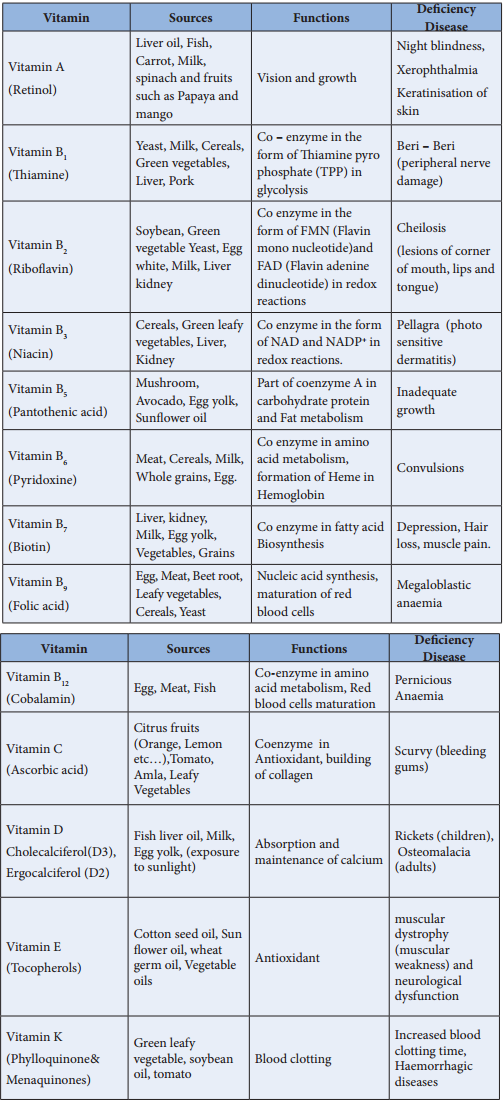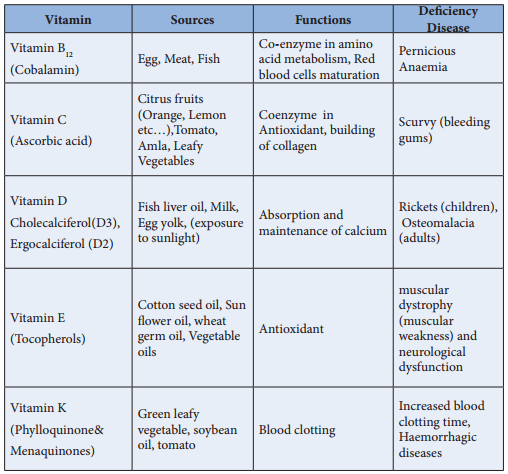Find free online Chemistry Topics covering a broad range of concepts from research institutes around the world.
Biomolecules of Vitamins and Their Functions
Vitamins are small organic compounds that cannot be synthesised by our body but are essential for certain functions. Hence, they must be obtained through diet. The requirements of these compounds are not high, but their deficiency or excess can cause diseases. Each vitamin has a specific function in the living system, mostly as co enzymes.
They are not served as energy sources like carbohydrates, lipids, etc. The name ‘Vitamin’ is derived from ‘vital amines’, referring to the vitamins earlier identified amino compounds. Vitamins are essential for the normal growth and maintainance of our health.
Classification of Vitamins
Vitamins are classified into two groups based on their solubility either in water or in fat.
Fat Soluble Vitamins:
These vitamins absorbed best when taken with fatty food and are stored in fatty tissues and livers. These vitamins do not dissolve in water. Hence they are called fat soluble vitamins. Vitamin A, D, E & K are fat-soluble vitamins.
Water Soluble Vitamins:
Vitamins B (B1, B2, B3, B5, B6, B7, B9 and B12) and C are readily soluble in water. On the contrary to fat soluble vitamins, these can’t be stored. The excess vitamins present will be excreted through urine and are not stored in our body. Hence, these two vitamins should be supplied regularly to our body. The missing numbers in B vitamins are once considered as vitamins but no longer considered as such, and the numbers that were assigned to them now form the gaps.
Table 14.2: Vitamins, their Sources, Functions and their Deficiency Disease


A diverse range of biomolecules exist,
Including:
Small Molecules:
Lipids, fatty acids, glycolipids, sterols, monosaccharides. Vitamins.
Biological Function of Vitamins
Once growth and development are completed, vitamins remain essential nutrients for the healthy maintenance of the cells, tissues, and organs that make up a multicellular organism; they also enable a multicellular life form to efficiently use chemical energy provided by food it eats, and to help process
the proteins, All of the biomolecules that make up our cells are made up of strings of monomers.
For example, proteins are made up of strings of amino acids and nucleic acids are strings of nucleotides. The term for a long string of monomers is a polymer. The biomolecules, proteins, carbohydrates and nucleic acids are all polymers.
Vitamins and minerals are considered essential nutrients-because acting in concert, they perform hundreds of roles in the body. They help shore up bones, heal wounds, and bolster your immune system. They also convert food into energy, and repair cellular damage.
Vitamin, any of several organic substances that are necessary in small quantities for normal health and growth in higher forms of animal life. Vitamins are distinct in several ways from other biologically important compounds such as proteins, carbohydrates, and lipids.